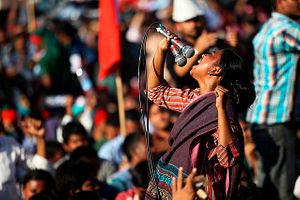On September 28, 2015, an Italian aid worker was killed by unknown assailants in the nation’s capital, Dhaka. The victim, identified as Cesare Tavella, was followed by three men before he was shot three times and left for dead. The attack prompted widespread shock across the city, partly because the incident occurred in an affluent neighborhood and partly because foreign nationals are rarely attacked in Bangladesh. Five days later, on October 3, a Japanese national, Kunio Hoshi, was shot dead three times in Rangpur, a remote district in northern Bangladesh. The Islamic State (ISIS), the radical Islamist militant group operating primarily in Iraq and Syria, claimed responsibility for the murders.
Prime Minister Sheikh Hasina was quick to refute reports of ISIS involvement, insisting that the group is not active in Bangladesh while simultaneously reaffirming the government’s commitment to cracking down on fundamental groups. Instead, the prime minister accused the Bangladesh National Party (BNP), the current opposition party, and its ally the Jamaat-e-Islami, of orchestrating and abetting the killings of two foreign nationals, claiming they were attempting to undermine the current government.
Bangladesh is no stranger to hosting militant fundamentalist groups. Jamaat-e-Islami, the largest Islamic political party in the country and a key ally of BNP, has been embroiled in controversy after the International Crimes Tribunal, established in 2009 to investigate and prosecute those accused of committing war crimes during the 1971 liberation war of Bangladesh, convicted several of Jamaat’s front-ranking leaders. The leaders were initially given life sentences, but the popular Shahbag movement of 2013, led by secular-humanist bloggers, demanded (and got) capital punishment. More recently, Hefazat-e-Islam, another militant group with ties to the Taliban in Afghanistan, emerged as a consequence of allegations that several protesters involved in the Shahbag movement had published content offensive to Muslims on their blogs. Their violent siege on Dhaka city in May only ended after paramilitary troops opened fire, killing over 50 of its members.
The deaths of Tavella and Hoshi further expose a gaping divide between secularism and religion in an increasingly intolerant society. Since February of this year, four secular bloggers have been brutally murdered; these four men were named on a “hit list” published by the Islamic militant group Ansarullah Bangla Team, calling for the deaths of those critical of extremist religious doctrine. The moderately secular society and the rising conservative Islamists are finding themselves in a clash over the role and importance of religion in state politics and society. A traditionally secular country, the rising tide of fundamentalism is drowning the progressive values spouted by Sheikh Hasina’s government.
The incidents in 2015 have sparked concern in the international community, which fears Bangladesh could be staging point for militant groups hoping to target its neighbors by recruiting and developing local insurgents to unite with regional fundamentalist organizations. While the government has taken positive steps to curb the spread of fundamentalism in the country, the threat is far from removed. With financial backing from domestic and foreign sources, one can grimly assume that these groups are simply biding their time until the next attack.
Farasha Bashir is the Communication and Knowledge Manager at the James P Grant School of Public Health, BRAC University.

































